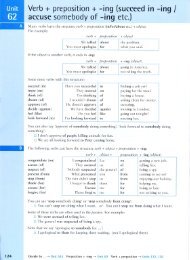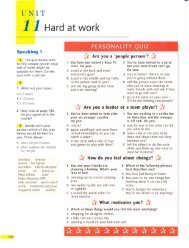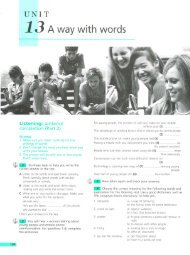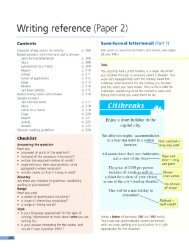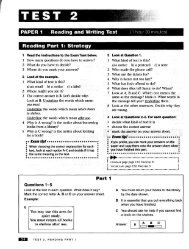11lt's how you tell it
11lt's how you tell it
11lt's how you tell it
Create successful ePaper yourself
Turn your PDF publications into a flip-book with our unique Google optimized e-Paper software.
T-INI T<br />
<strong>11lt's</strong> <strong>how</strong> <strong>you</strong> <strong>tell</strong> <strong>it</strong><br />
Reading: gapped text (Part2)<br />
Strategy<br />
'I Skim through the gapped text to understand the<br />
story or argument.<br />
2 Look carefully for linking words, referring pronouns,<br />
determiners and abstract nouns in the gapped text<br />
and the missing paragraphs.<br />
3 Make sure <strong>you</strong> check <strong>you</strong>r chosen paragraph f <strong>it</strong>s<br />
w<strong>it</strong>h what comes before and after the gap.<br />
I Stim through the text quickly and answer these<br />
questions.<br />
1 What type of books do men like reading<br />
2 How did the wr<strong>it</strong>ers find out about men5 reading hab<strong>it</strong>s<br />
I<br />
Vou are going to read an article about what men<br />
read. Six paragraphs have been removed from the<br />
article. Choose from the paragraphs A-G the one<br />
which f<strong>it</strong>s each gap (1-6). There is one extra paragraph<br />
which <strong>you</strong> do not need to use.<br />
What books mean to men<br />
When we asked women which book had helped them<br />
most during their lives, the clear winner was Jane E1tre,<br />
w<strong>it</strong>h Pride and Prejudice not too far behind. When we<br />
repeated the exercise w<strong>it</strong>h men, a very different reading<br />
list emerged.<br />
For men, fiction was a r<strong>it</strong>e of passage into manhood<br />
during painful adolescence. Many men adm<strong>it</strong>ted that<br />
they had read l<strong>it</strong>tle fiction since, though mature men<br />
returned to fiction reading in later life and expressed<br />
increasing enjoyment in reading for'self-reflection'.<br />
This year, we tackled the obvious next question: what<br />
do men read to get them through life Women had<br />
described a number of key moments in their life at<br />
which they unselfconsciously acknowledged that fiction<br />
had offered them guidance or solace. But many men we<br />
approached did not seem to associate reading fiction<br />
w<strong>it</strong>h life choices. One told us: 'I guess that if <strong>you</strong> adm<strong>it</strong><br />
to having a watershed novel, then <strong>you</strong>'re adm<strong>it</strong>ting to<br />
having a watershed moment, which is something that a<br />
lot of men don't necessarily want to divulge.'<br />
We found a strong sense of nostalgia among male<br />
readers as they looked back to their formative years;<br />
many had tended to lose interest in fiction in favour of<br />
non-fiction on entering into adulthood. One<br />
consequence of this was that several men adm<strong>it</strong>ted that<br />
they were reluctant to re-read a book which had been<br />
almost painfully important to them at puberty. 'I'm<br />
afraid I might find <strong>it</strong> too mawkish now', 'It might not<br />
live up to my memories', 'It might seem dated now'<br />
became familiar responses.<br />
Still, in sp<strong>it</strong>e of a certain anxiety about revealing that<br />
fiction had any impact on their day-to-day lives, the<br />
great major<strong>it</strong>y of our respondents were intrigued by our<br />
inquiry and happily offered us time, leading to some<br />
fascinating results. Men's formative reading does<br />
indeed differ markedly from women's.<br />
Part of the reason this type of theme resonated w<strong>it</strong>h<br />
them was that, to a far larger degree than women, men's<br />
formative reading was done between the ages of 12 and<br />
20 - indeed, specifically around the ages of l5 and 16.<br />
A further difference was that men were much more<br />
specific and l<strong>it</strong>eral about the kind of plot and character<br />
they were interested in reading about. This may have<br />
produced an accidental concentration on male authors,<br />
fbr 'adventure' and 'triumphing over advers<strong>it</strong>y' fiction.<br />
This did not seem ever to be the case for men, though<br />
some men adm<strong>it</strong>ted to having made a sound investment<br />
in an author - such as Orwell - whom they used as a<br />
guide throughout their adult life on the basis of a first<br />
encounter in adolescence.<br />
{i;:i};'lr,r:'-. {t12
tiNIT l.+ lts <strong>how</strong> <strong>you</strong> <strong>tell</strong> <strong>it</strong><br />
A<br />
Men's reading clearly s<strong>how</strong>s a major<strong>it</strong>y of books w<strong>it</strong>h<br />
strong active narrative themes - books that might<br />
trad<strong>it</strong>ionally be described as quintessential boys' books.<br />
No surprise there, perhaps. Except these choices were<br />
made on the basis of a conscious comm<strong>it</strong>ment to novels<br />
that take the reader in a direction of personal<br />
development. Men's reading choices focus on novels<br />
that include in<strong>tell</strong>ectual struggle. Personal vulnerabil<strong>it</strong>y<br />
is represented as an angst-ridden struggle against<br />
convention, a sense of isolation fiom social normal<strong>it</strong>y.<br />
B<br />
Many adult men we talked to openly s<strong>how</strong>ed an almost<br />
complete lack of interest in reading which drew them<br />
into personal introspection, or asked them to engage<br />
w<strong>it</strong>h the family and the domestic sphere. On the other<br />
hand, those who had remained avid readers could see<br />
distinct patterns emerging in their choices which<br />
differed from those selected by women.<br />
c<br />
A l<strong>it</strong>tle over a year ago, we conducted a survey of<br />
women readers to find a 'watershed' women's novel -<br />
the book which, above all others, had sustained<br />
individual women through key moments of trans<strong>it</strong>ion or<br />
crisis in their lives. The top t<strong>it</strong>les that emerged were<br />
surprisingly varied. They ranged from The Lord of the<br />
Rings to Gone vv<strong>it</strong>h the Wind.<br />
D<br />
However, looking back, men also recalled a kind of<br />
'mentoring'by authors encountered as a teenager - the<br />
same word was used by a surprising number of those<br />
we interviewed. Having found an author who 'spoke' to<br />
them, a man would have trusted them as a l<strong>it</strong>erary<br />
guide, reading all of their works, and also works quoted<br />
from or c<strong>it</strong>ed by them. Orwell, in particular, was c<strong>it</strong>ed<br />
fiequently as having guided our male reader in his<br />
choices of author. This idea of mentoring had never<br />
cropped up in our survey of women's reading.<br />
E<br />
So <strong>how</strong> do we interpret the men's list, and our outright<br />
winner - Camus's The Outsider Men use fiction<br />
almost physically as a guide to negotiate a difficult<br />
journey. They use fiction almost topographically, as a<br />
map. Many of our women respondents explained that<br />
they used novels metaphorically - the build-up to an<br />
emotional crisis and subsequent resolution might have<br />
helped negotiate an emotional progress through a<br />
difficult divorce, or provided support during a difficult<br />
period at work, or provided solace when things seemed<br />
generally dull.<br />
F<br />
In an effort to explain this rediscovery of reading,<br />
Professor Rob Dickins, a record-industry impresario<br />
w<strong>it</strong>h boundless energy for reading, whom we had<br />
interviewed early on in our survey, pointed out this<br />
reading in later life was bound to be influenced by that<br />
emotionally shaping early reading. He felt that women<br />
and men would surely arrive in matur<strong>it</strong>y at different<br />
patterns of reading based on adolescent choices.<br />
G<br />
Amongst those who were prepared to acknowledge this<br />
'weakness', men's reading did not s<strong>how</strong> the same range<br />
as the women's had done. The choices clustered around<br />
a set of out-and-out favour<strong>it</strong>es, such as Camus's The<br />
Outsider and Salinger's The Catcher in the Rye. These<br />
t<strong>it</strong>les remained consistently popular, which was<br />
something that failed to happen w<strong>it</strong>h the women's t<strong>it</strong>les,<br />
which changed daily, throwing up l<strong>it</strong>tle-known books<br />
alongside familiar classics.<br />
! Practise transferring <strong>you</strong>r answers to the answer sheet (see Key).<br />
3 iAesgEIg<br />
v<br />
ABCDEFGH<br />
I::-(::-(::-t:-t- l- (- r:-<br />
--f- ---<br />
4IA B C D E F G<br />
i--<br />
-T- 5rA B C D E F G<br />
_r_-<br />
tt::: r--: e- i- t:- .....<br />
AIABCDEFG<br />
- i-.--- rL- rJ, 'r<br />
r<br />
_+____<br />
Hl<br />
I<br />
HI<br />
= H] r:]<br />
l<br />
Hl<br />
--i<br />
;1-19*tr.,f$
t NlT l-l lt's <strong>how</strong> <strong>you</strong> <strong>tell</strong> <strong>it</strong><br />
Vocabulary'l : !:loci CB pago i6')<br />
I<br />
Complete the crossword.<br />
;rnd stories<br />
derivative<br />
brims w<strong>it</strong>h<br />
cliches<br />
flash backs<br />
6 densely (wr<strong>it</strong>ten)<br />
7 convincing<br />
8 paints a picture<br />
I<br />
iii)<br />
tv)<br />
making <strong>you</strong> believe <strong>it</strong> is true or<br />
right<br />
the scene described at the<br />
beginning of a book<br />
describes something in a<br />
particular way<br />
v) to have a lot of a particular<br />
thrng, qual<strong>it</strong>y or emotion<br />
vi) scenes that s<strong>how</strong> something<br />
that happened before that<br />
point in the book<br />
vii) copied or taken from another<br />
source (derogatory)<br />
viii) containing a lot of information;<br />
difficult to understand<br />
use the words and expressions in Exercise 2 to<br />
complete the review below.<br />
't14<br />
Across<br />
3 one book in a series of books, e.g. an encyclopedia<br />
4 to read quickly to find the main facts or ideas<br />
7 to read or deal w<strong>it</strong>h a lot of boring wr<strong>it</strong>ten work<br />
8 the soft-cover version of a book<br />
1 1 an exc<strong>it</strong>ing story about a murder or crime<br />
Down<br />
'l a popular book which many people buy<br />
2 copies of a book that are produced and printed at the<br />
same time<br />
5 a detective story where <strong>you</strong> don't find out who<br />
comm<strong>it</strong>ted the crime until the end<br />
6 to read short parts of a book but not the whole thing<br />
9 the summary on the back cover<br />
10 one of many books that are all exactly the same<br />
I<br />
wtatch the words and expressions that we can<br />
use when we talk about books below to their<br />
meanings. Use a good dictionary, such as The Longman<br />
Exams Dictionary, to help <strong>you</strong>.<br />
1 opens w<strong>it</strong>h i) an idea or phrase that's been<br />
used so much that <strong>it</strong> is not<br />
effective<br />
SIGN OF THE TIMES<br />
This historical novel (1)<br />
of <strong>how</strong> life was<br />
lived during the war. The novel (2).................... the<br />
central character, Elise, arriving at a party at the end<br />
of the war and the rest of the story is told in a series<br />
of (3) ...... . ........... The plot is, at times, complicated<br />
and some parts are (4) .................... but the wr<strong>it</strong>ing<br />
is fresh and devoid of the usual (5) .. . . .... used<br />
to describe the war. lt (5) .................... energy and<br />
v<strong>it</strong>al<strong>it</strong>y as <strong>it</strong> <strong>tell</strong>s the tale of a <strong>you</strong>ng girl coming of<br />
age at a time of turmoil. The emotions and concerns<br />
that Elise feels are entirely (7) .................... and we<br />
can almost imagine ourselves there w<strong>it</strong>h her. How<br />
welcome this novel is after so many unoriginal and<br />
(8)............ ....... novels on the subject.<br />
Speaking<br />
Put the following advice into the correct column:<br />
use a range of vocabulary and structures<br />
repeat <strong>you</strong>r points<br />
listen to <strong>you</strong>r partner<br />
ask the examiner to repeat anything <strong>you</strong> don't understand<br />
speak as quickly as possible<br />
go back and correct <strong>you</strong>rself if <strong>you</strong> make a mistake<br />
disagree w<strong>it</strong>h something said if <strong>you</strong> have a different view<br />
DO<br />
DON'T
I'r-lT l+ lt's <strong>how</strong> <strong>you</strong> <strong>tell</strong> <strong>it</strong><br />
Listening: short texts (Part 1)<br />
Strategy<br />
1 You will be given a short time to read through the<br />
questions before <strong>you</strong> listen.<br />
2 Use the information in the questions to predict the<br />
vocabulary and structures <strong>you</strong> expect to hear.<br />
I<br />
Vou will hear three different extracts. For<br />
questions 1-6, choose the answer (A, B or C) which f<strong>it</strong>s<br />
best according to what <strong>you</strong> hear.<br />
4 How does the boy feel about reading books<br />
A irr<strong>it</strong>ated that he cannot finish a book quickly<br />
B worried that he will not understand some words<br />
C frustrated that he cannot see the point of reading<br />
books<br />
You hear part of an interview w<strong>it</strong>h a newspaper ed<strong>it</strong>or,<br />
5ally Hughes.<br />
5 According to Sally, books will be less available in the<br />
future because<br />
A books will only be published on the internet.<br />
B publishers will invest less in paper books.<br />
C bookshops will decrease in number.<br />
6 When talking about wr<strong>it</strong>ing in the future, what do the<br />
two speakers agree about<br />
A Authors will need to change their style.<br />
B The type of novels available will alter.<br />
C The qual<strong>it</strong>y of wr<strong>it</strong>ing will remain unchanged.<br />
I<br />
Practise transferring <strong>you</strong>r answers to the answer<br />
sheet (see Key).<br />
You hear two people on a radio programme talking<br />
about the book lhe Pelican Brief .<br />
1 What did the man particularly enloy about lhe Pelican<br />
Brief<br />
A <strong>it</strong>s pace<br />
B <strong>it</strong>s ending<br />
C <strong>it</strong>s subject matter<br />
2 According to the woman, <strong>how</strong> does The Pelican Brief<br />
compare w<strong>it</strong>h other novels by the same author<br />
A The plot is more convincing.<br />
B The characters are more likeable.<br />
C The themes are more interestinq.<br />
I<br />
Cfrect< <strong>you</strong> know the meanings of these words<br />
and expressions from the listening extracts. Complete<br />
each of the sentences below w<strong>it</strong>h the correct form of<br />
one of the words or expressions.<br />
You hear part of a conversation in a bookshop<br />
between a mother and her son.<br />
3 Why does the woman think that boys read so l<strong>it</strong>tle<br />
A They lack the necessary concenlration.<br />
B They play too much sport and too many computer<br />
games.<br />
C They think their friends are more important than<br />
readrnq.<br />
1 The book....... some rnterestrng questrons.<br />
2 Ithought the film was so bad that <strong>it</strong> ..................<br />
reading the book<br />
3 Shes very......... and has wr<strong>it</strong>ten 60 books<br />
altogether.<br />
of the time meant she had to<br />
wr<strong>it</strong>e under a man s name.<br />
The social<br />
The cafe was a place where authors met and<br />
together.<br />
I
t:NlT 14 lt's <strong>how</strong> <strong>you</strong> <strong>tell</strong> <strong>it</strong><br />
rffi<br />
Grammar 1: expressions w<strong>it</strong>h get<br />
and have<br />
I<br />
vatctt the sentences below to the use of the<br />
structure.<br />
a) Get the k<strong>it</strong>chen cleared up before I come home!<br />
b) I must get the television fixed before the cup final!<br />
c) I got my science project done this weekend.<br />
d) Can <strong>you</strong> get <strong>you</strong>r boss to speak to <strong>you</strong>r colleague about<br />
the problem<br />
e) She had her MP3 player stolen this afternoon.<br />
1 finish something<br />
2 used in orders or w<strong>it</strong>h imperatives<br />
3 something unfortunate that happens to someone<br />
4 ask someone else to perform an action on our behalf<br />
5 something we don't do ourselves, but someone does<br />
for us<br />
I<br />
the correct form of the words in brackets.<br />
1 I ................... in a salon down the road. (hair / cut)<br />
2 I must wr<strong>it</strong>ten by Monday. (letter /wr<strong>it</strong>e)<br />
3 ................... or l'll throw everything out. (room / tidy)<br />
4 I need to ................... - I never know the time!<br />
(watch / repair)<br />
5 Why don't <strong>you</strong><br />
the decorating for <strong>you</strong><br />
(hin /do)<br />
6 We're going to<br />
in the summer.<br />
(house / paint)<br />
7 l'm going to ........ for my new computer<br />
(father / pay)<br />
Comptete these sentences using get or have and<br />
Use of English: gapped sentences<br />
(Part 4)<br />
Irfrint<br />
of one word only which can be used<br />
appropriately in all three sentences.<br />
1<br />
HeS just<br />
do now!<br />
his job in so I don't know what he'll<br />
It was rush hour so the trains were absolutely ....................<br />
Please make sure <strong>you</strong> get <strong>you</strong>r su<strong>it</strong>case .................... and<br />
ready to take downstairs by 1pm.<br />
2<br />
The country was<br />
strike.<br />
. . into chaos by the transporl<br />
The restaurant is now closed so if <strong>you</strong> don't leave I will have<br />
<strong>you</strong> .................... out.<br />
After he spoke the debate was .................... open to the<br />
audience.<br />
3<br />
ln this lecture, l'll will be examining where the<br />
of the English language took place.<br />
She speaks Hindi well but shes Br<strong>it</strong>ish by<br />
I was so exc<strong>it</strong>ed about the<br />
couldn't wa<strong>it</strong>.<br />
of my child that I<br />
4<br />
I gave the ball such a hard .................... that <strong>it</strong> went out of<br />
play.<br />
Why do <strong>you</strong> always up such a fuss about<br />
going to the dentist<br />
lf he doesn't study harder I think they will .................... him<br />
out!<br />
5<br />
I know the song but I can't put a .. ................. to <strong>it</strong>.<br />
People often comm<strong>it</strong> very selfless acts in the<br />
of love.<br />
I would have had a lot of tax to pay so I registered the<br />
business in my son's<br />
I<br />
Practise transferring <strong>you</strong>r answers to the answer<br />
sheet. Remember to use cap<strong>it</strong>al letters.<br />
Ef{T,T tl<br />
E<br />
E<br />
E<br />
E]<br />
ilN<br />
Vocabulary 2: synonyms<br />
I<br />
2 10u<br />
tl<br />
o u<br />
4<br />
10u<br />
5<br />
l0u<br />
frlatch each of these words to their defin<strong>it</strong>ions.<br />
Use a good dictionary, such as The Longmans Exams<br />
Dictionary, to help <strong>you</strong>.<br />
1 boost increase maximise<br />
a) become larger in amount, number or degree<br />
b) increase something to the greatest possible size<br />
c) get more of; improve something<br />
2 far-fetched unlikely inconceivable<br />
a) not probable or expected<br />
b) very unlikely to be true<br />
c) too strange or unusual to be real or possible<br />
3 typically generally normally<br />
a) in a way that a person or group rs usually believed to<br />
behave<br />
b) by or to most people; considering something as a<br />
whole<br />
c) in the usual or expected way
LNtT 14 lt's <strong>how</strong> <strong>you</strong> <strong>tell</strong> <strong>it</strong><br />
4 countless numerous<br />
a) too many to calculate the total<br />
number<br />
b) very many<br />
5 coincidence luck chance<br />
a) the force that seems to make good<br />
things happen w<strong>it</strong>hout cause or reason<br />
b) when events happen at the same time<br />
in the same place or to the same<br />
people in a way that seems surprising<br />
or unusual<br />
c) the way some things happen w<strong>it</strong>hout<br />
being planned<br />
I ut" words from Exercise 1 to<br />
complete these sentences. The words in<br />
bold are words that go w<strong>it</strong>h the missing<br />
word. Use <strong>you</strong>r dictionary to help <strong>you</strong>.<br />
1 l'm hoping 1o.................... my<br />
confidence by buying a new su<strong>it</strong> for the<br />
interview.<br />
2 Her story was pretty ....................!<br />
I wonder if she made <strong>it</strong> up.<br />
Its .................... that he would behave<br />
like that. I don't believe <strong>you</strong>.<br />
3 lt is.......... . ....... accepted that the story<br />
is true.<br />
Pasta is a .................... ltalian dish.<br />
4 The vaccination has saved ....................<br />
lives.<br />
5 lt was pure .................... that we were<br />
on the same trainl<br />
Use of English: word<br />
formation (Part 3)<br />
I<br />
neaO the text. Use the word given<br />
in cap<strong>it</strong>als to form a word that f<strong>it</strong>s the<br />
space. There is an example at the<br />
beginning (0).<br />
How to talk about books that<br />
<strong>you</strong> haven't read<br />
A (01 .4.igIi.nSuia-h.ed. French professor has become a surprise DISTINGUISH<br />
bestselling author by wr<strong>it</strong>ing a book explaining <strong>how</strong> to wax<br />
(1) .................... about tomes that <strong>you</strong> have never actually INTELLECT<br />
read. Pierre Baynard, a (2) . . . . ........... in the link between SPECIAL<br />
l<strong>it</strong>erature and psychoanalysis, says <strong>it</strong> is perfectly possible to bluff<br />
<strong>you</strong>r way through a book that <strong>you</strong> have never read, most<br />
(3) ................ . . if that conversation is w<strong>it</strong>h someone else who REWARD<br />
also hasn't read <strong>it</strong>.<br />
Obviously I haven't read Mr Baynard's book, but <strong>it</strong> is in the spir<strong>it</strong><br />
of his (4) that I shall proceed to wr<strong>it</strong>e about <strong>it</strong> BELIEVE<br />
anyway. The first thing to say about How to Talk About Books<br />
that You Haven't Read is what a (5) .... concept this MASTER<br />
is. ln many circles, <strong>it</strong> is crucial to be able to hold <strong>you</strong>r own in a<br />
(5) .................... conversation, but the trouble is, in these LITERATURE<br />
hurried times, who has the (7) ... ................ to really get to the PERSEVERE<br />
bottom of Proust<br />
Baynard himself confesses to never having finished U/ysses, by<br />
James Joyce.<br />
Personally, I have a theory that there is every (8)<br />
UKELY<br />
that Joyce himself didn't even finish wr<strong>it</strong>ing the book, since<br />
I have never actually met anyone who has read the thing cover<br />
to cover. Perhaps Ulysses is a book made (9)<br />
READ<br />
by the author just to expose frauds. Perhaps Joyce was<br />
(10). . . .. . . ....... having a laugh. PURPOSE<br />
I<br />
Remember to use cap<strong>it</strong>al letters.<br />
I!<br />
E]<br />
t1]<br />
E]<br />
E<br />
F]<br />
LI<br />
tL<br />
E<br />
F4<br />
practise transferring <strong>you</strong>r answers to the answer sheet.<br />
*,4*dd,,ffi1
IINIT 1,1 lt's <strong>how</strong> <strong>you</strong> <strong>tell</strong> <strong>it</strong><br />
Grammar 2: mistakes<br />
> CB paEes '173-174<br />
time I cant wa<strong>it</strong> for the next book to come out<br />
i<br />
Question 2<br />
paot and<br />
arbicle:<br />
\ next year the questions and possibil<strong>it</strong>ies for the<br />
presenb<br />
informal,<br />
I<br />
next book at the end of this one leave <strong>you</strong> wa<strong>it</strong>ing<br />
tengeg,<br />
t<strong>it</strong>le<br />
t modals<br />
tt for more overall this is well worth reading<br />
I<br />
f n which sections of the exam is punctuation<br />
important<br />
Reading: Part 1<br />
f, Part2! Part3X Part4[<br />
! Correct the spelling of these words. One of them Wr<strong>it</strong>ing: Part 1<br />
! Part2! Part3f Part4[<br />
is correct.<br />
English in Use: Part 1<br />
! Part2f Part3! Part4[<br />
wether (if)<br />
Listening: Part 1<br />
I Part2! Part3tr Part4n<br />
neccessary<br />
recreve<br />
dissappointing<br />
Wr<strong>it</strong>ing 1: Part 2 questions<br />
choise<br />
intresting<br />
reccommendation<br />
beleive<br />
comfortable<br />
recquire<br />
Choosing a Part 2 question<br />
ln Part 2 <strong>you</strong> have a choice of three questions on general<br />
topics and two set text questions (see below). You should<br />
choose the question where <strong>you</strong> are familiar and comfortable<br />
w<strong>it</strong>h what is required. You should NOT choose the set text<br />
question unless <strong>you</strong> are familiar w<strong>it</strong>h one of the set texts.<br />
I eut the correct punctuation in this article and<br />
decide where <strong>it</strong> should be paragraphed.<br />
I t-ook at these possible Part 2 general questions.<br />
1 Many people collect things. Wr<strong>it</strong>e an article for a<br />
*"*t<br />
magazine describing what <strong>you</strong> collect, explaining <strong>how</strong><br />
<strong>you</strong> became interested in collecting and persuading other<br />
HARRY POTTER<br />
people to start a collection of something.<br />
2 Your teacher asks <strong>you</strong> to wr<strong>it</strong>e an essay on the following<br />
AND THE HALF-BLOOD<br />
subject:<br />
PRI NCE<br />
Large shops are ruining our towns. Small, interesting<br />
shops struggle to survive and the big shops all sell the<br />
the story in this book is a lot darker than the<br />
previous ones and opens up more possibil<strong>it</strong>ies for<br />
same things!<br />
How far do <strong>you</strong> agree w<strong>it</strong>h this statement<br />
the storyline relationships are made so we<br />
3 You have been asked to wr<strong>it</strong>e a report on a sports course<br />
understand the characters more there are a few<br />
<strong>you</strong> attended. ln <strong>you</strong>r report briefly describe <strong>you</strong>r<br />
surprises and we learn a few things about<br />
experience, suggest <strong>how</strong> the course could be improved in<br />
Voldemorte we also learn more about the<br />
the future and say whether or not <strong>you</strong> would recommend<br />
characters feelings towards each other not that<br />
the course to others.<br />
these werent fairly clear through the previous few<br />
books <strong>how</strong>ever the story isnt qu<strong>it</strong>e as enjoyable as<br />
! Complete the table w<strong>it</strong>h the type of language<br />
the others the humour seems to be a l<strong>it</strong>tle darker<br />
required for each question.<br />
and there is less action in this but this doesnt affect<br />
the book much overall I loved <strong>it</strong> although <strong>it</strong> seems<br />
I to be orientated more towards older readers this<br />
topic<br />
vocabulary<br />
grammar functional<br />
language<br />
task type<br />
Question 3<br />
ahopping,<br />
buildings<br />
118<br />
I<br />
important<br />
Reading: Part 1<br />
Wr<strong>it</strong>ing: Part 1<br />
tn which sections of the exam is spelling<br />
English in Use: Part i<br />
Listening: Part 1<br />
! Part2 !<br />
f Part2!<br />
! Part2f<br />
! Part2!<br />
Part3f Part4<br />
Part3! Part4<br />
Part3! Part4<br />
Part3[ Part4<br />
n<br />
I<br />
n<br />
T<br />
Question 4<br />
describing,<br />
oug1eating,
IINIT 14 lts <strong>how</strong> <strong>you</strong> <strong>tell</strong> <strong>it</strong><br />
I<br />
wfri.f, two features - vocabulary, grammar,<br />
functional language, genre - are the most important in<br />
making <strong>you</strong>r decision<br />
Check <strong>you</strong>r answer in the Key to see if <strong>you</strong> made the right<br />
choice.<br />
Wr<strong>it</strong>ing 2: the set text question<br />
(Part 2)<br />
About the exam: ln Paper 2, Part 2, Question 5, <strong>you</strong><br />
will have the choice of wr<strong>it</strong>ing about a set text. You<br />
will have a choice of two set texts. There will be one<br />
question for each set text. You may be asked to wr<strong>it</strong>e<br />
an essay, a review an article or a report.<br />
Strategy<br />
1 Do NOT attempt this question if <strong>you</strong> do not know<br />
the book, even if the t<strong>it</strong>le sounds familiar.<br />
2 Make sure <strong>you</strong> are familiar w<strong>it</strong>h the part of the<br />
book that the question asks <strong>you</strong> to focus on e.g. the<br />
characters or a particular scene or event.<br />
3 Don't wr<strong>it</strong>e too much on describing the plot. Look at<br />
the question carefully and make sure <strong>you</strong> cover all<br />
the points equally.<br />
I<br />
Fo.rt.<br />
Below are some points <strong>you</strong> may be asked on a question<br />
on a set text. Think of a book <strong>you</strong> know and see if <strong>you</strong><br />
can do any of these tasks:<br />
. Compare two of the characters<br />
. Evaluate the beginning (did <strong>it</strong> get <strong>you</strong> interested<br />
immediately)<br />
o Evaluate the ending of the book (could <strong>it</strong> have been<br />
different)<br />
. Describe what creates the tension or the comedy in the<br />
book<br />
. Describe who was the most likeable and the least likeable<br />
character (why)<br />
r Describe the setting (location or time period) of the book<br />
I<br />
planning.<br />
Questions on the set texts will usually ask for <strong>you</strong>r<br />
evaluation and views. You will not be expected to describe<br />
the plot in detail or quote from the book. Only a part of the<br />
question will ask <strong>you</strong> to describe something from the book.<br />
You must plan <strong>you</strong>r answer carefully to cover all the points<br />
and give a balanced response.<br />
Look at this example question and plan:<br />
Your teacher has asked <strong>you</strong> to wr<strong>it</strong>e an essay comparing<br />
two characters in a book <strong>you</strong> have read, saying which <strong>you</strong><br />
prefer and why. Wr<strong>it</strong>e <strong>you</strong>r answer in 220-260 words.<br />
Plan<br />
paragraph 1 : introduction 20-30<br />
paragraph 2: brief description<br />
of the two characters (e.9.<br />
names and role in the novel)<br />
paragraph 3: comparison of<br />
personal<strong>it</strong>y<br />
paragraph 4: which I prefer<br />
and why<br />
Make a similar plan for the question below.<br />
You are asked to wr<strong>it</strong>e an article for <strong>you</strong>r college English<br />
language magazine on a book <strong>you</strong> have read recently.<br />
Describe the most important event in the book, explain why<br />
<strong>it</strong> was important and what <strong>you</strong> think would have happened<br />
if this event had not taken place. Wr<strong>it</strong>e <strong>you</strong>r answer in<br />
220-260 words.<br />
Plan<br />
lmprove!<br />
Approx number of words<br />
Approx number of words<br />
How can <strong>you</strong> make <strong>you</strong>r answer to the set text<br />
question better<br />
. Don't just describe the plot of the book<br />
. Make sure <strong>you</strong> give <strong>you</strong>r opinion w<strong>it</strong>h reasons<br />
. Use a range of language, especially adjectives<br />
50<br />
70<br />
70<br />
paragraph 5: conclusion 20-30<br />
230-250<br />
I


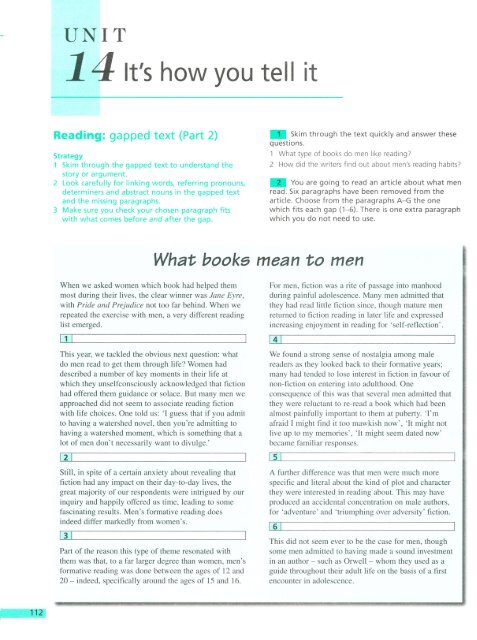
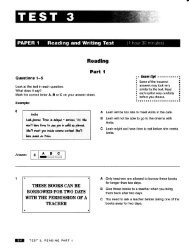
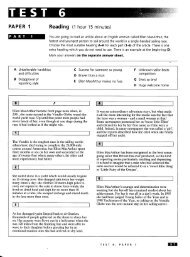
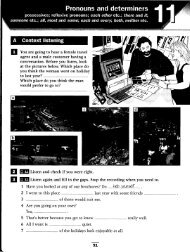
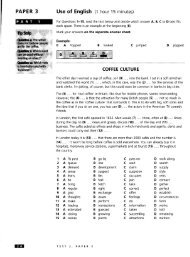
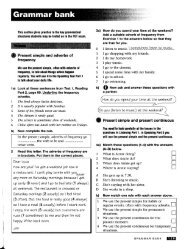
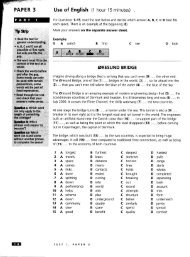
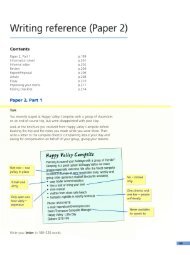

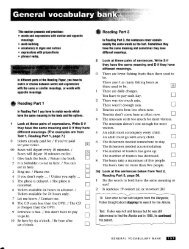
![T]NIT 9 A new look](https://img.yumpu.com/40125756/1/190x248/tnit-9-a-new-look.jpg?quality=85)
